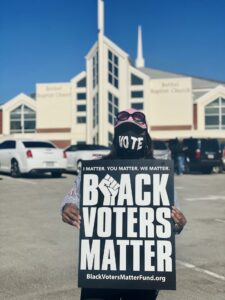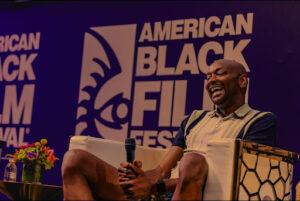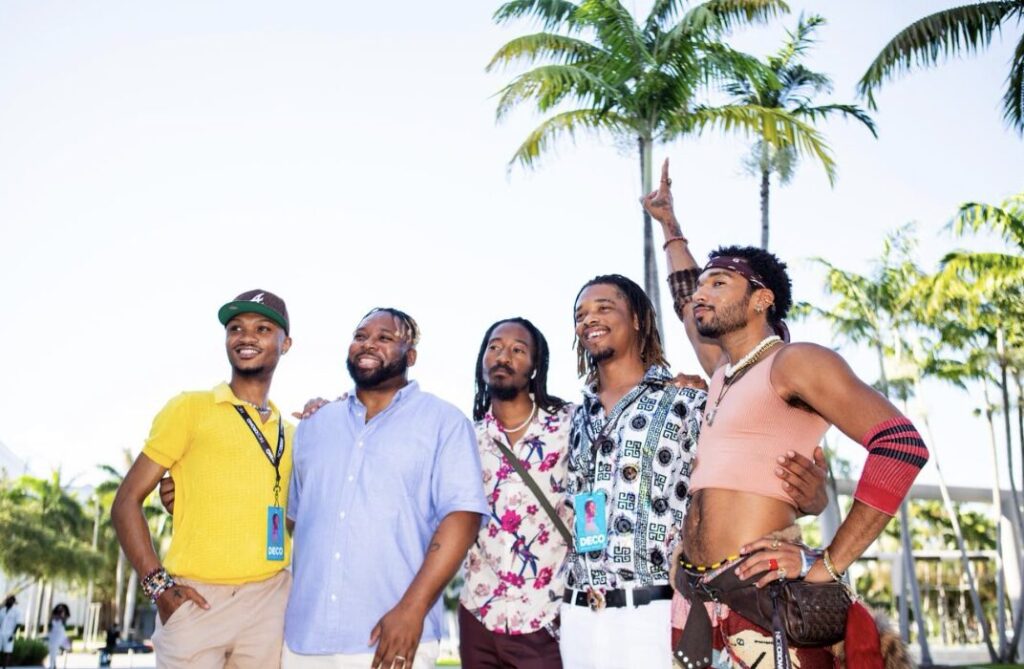By John Barnes, Communities of Color & Media Consultant
Arrival: Rest, Reflection, and Radiance
On Wednesday, June 11, 2025, I landed in Miami, FL, on a hot summer day around noon. This was no ordinary Miami trip — this was my first time attending the American Black Film Festival, and to do it as a GLAAD Ambassador was the icing on the cake. While they already had events for us to attend, I had work to do and much-needed rest to catch up on, since I was only home for two days after being in NYC for a week for MOBIfest. Sidenote: always put your wellness first, because you cannot pour from an empty cup.
“Love, Joy & Power”: A Blueprint for Empowerment
The following day, I was able to attend my first screening at the O Cinema — formerly a city hall, now a beautiful historic space to showcase national and international stories. The film, titled Love, Joy & Power: Tools for Liberation, made its debut, taking us behind the scenes of one of the largest Black voter empowerment efforts since the civil rights era. It chronicles the lives and work of the founders of the Black Voters Matter Fund, Cliff Albright (@cliffalbright) and LaTosha Brown (@mslatoshabrown), in the months leading up to the 2020 presidential election between Joe Biden and Donald Trump. I really enjoyed watching them in action, and I applaud them for continuing even when faced with death threats. It was really disheartening to know that people are still being targeted for simply trying to help Black people know their own power in voting.

During the talkback, I really loved learning that they did not turn away any people interested, even if they were individuals who could not vote due to being formerly incarcerated. Their goal was not to get huge numbers in voter registration; rather, the goal was to empower Black Americans — because an empowered person will not only register (if not already), but they will tell others to register, even if they cannot.
Their activism and canvassing served as a blueprint for how you can do serious work and still experience joy. The pop-up events created an opportunity for the community to come to them once they heard the music playing and saw incentives being passed out. With each incentive passed, they would ask for a verbal commitment from the attendee to spread the message.
As I watched it all play out on screen, their passion and determination were infectious. I could not help but feel a sense of connectedness and wonder how I could be a better advocate in my own community empowerment work. This film lit a fire under my you know what because it gave me a blueprint. Last year, I, along with my chosen brother J. Christopher — founder and executive director of Mobilizing Millennials — organized our first early voting march, called “Strike a Pose to the Polls.” During it, we met in front of Louis Armstrong Park in New Orleans, LA. From there, a mobile DJ on a tricycle led us on our march to City Hall. Along the way, we made a few stops to POSE for the frame, and participants were encouraged to do mini photoshoots.

We stopped at Backatown Coffee, a local Black-owned coffee shop; the JOY Theater — because what is voting without JOY? — and then on to our final destination, City Hall, where we went in to vote early. This documentary was very kismet for me, and it definitely inspired me to keep the faith and continue with the community empowerment work I am doing. My greatest takeaway from this documentary and talkback was LaTosha Brown stating, “It will not be our politics that saves us, it will be our humanity.”
Reel & Radiant: Queer Creativity in Conversation
Over the next two days I had the pleasure of attending Reel & Radiant: A Mixer for Black LGBTQ+ Creatives and Their Allies and a screening of the documentary series Come Together: Art’s Power for Change.

Reel & Radiant was a GLAAD-sponsored event in conversation with Patrik Ian-Polk and Okema T. Moore, moderated by Shar Jossell. Before the event started, I was awkwardly walking around looking for an open seat. I spotted one just past a gentleman sitting in the aisle, so I kindly asked if anyone was sitting next to him, and he said “no,” so I sat there. He introduced himself as “Nathan,” and I introduced myself as well. While just vibing and waiting on the discussion to start, I ended up hearing him mention being involved with Dirty Laundry — which is a cult classic film about a closeted Black gay man who goes back home to visit his mother, played by Loretta Devine, and all hell breaks loose when family secrets, AKA “dirty laundry,” are aired out. I thanked him for his involvement in bringing that story to life, as growing up, it was one of my first experiences of Black queerness in the media. If you have not seen it, pleaseeee check it out!
Although the panel discussion was short, it was insightful. Long-form dramas are the new niche, apparently. Okema reminded us that queer creatives can still create heteronormative stories — rather through a queer lens — and Patrik reminded us that there has never been another show like Noah’s Arc in the 20 years since it launched. Makes you wonder why this is? Side note: be sure to catch Noah’s Arc: The Movie on Paramount+! Let’s show them we want MORE!
“Come Together”: Full Circle Moments
On Saturday — remember Nathan, whom I sat next to during the Reel & Radiant panel discussion and mixer? Well, little did I know, the very next day I was going to end up watching his film, Come Together, a documentary about the makings of Dirty Laundry. Such a small world! Fun fact: Dirty Laundry actually premiered at ABFF and won Best Film! The documentary focused on a few key players, including the executive producers, making mention of one of the EPs who transcended this realm prematurely — Mr. Maurice Jamal. According to Nathan, Maurice was battling things and never got to reach his full potential, and he reiterated the importance of community and the need to appreciate people while they are here.

The documentary included cameos of various Black queer individuals giving their take on the importance of the film and other content like it. A few moments that stood out were when one person said, “I think stories that go out of their way to be progressive tend to last longer.” Another guy spoke about how, before he came out, he feared that coming out would affect his money — but as he came out, the money started to pour in! This reminds me of the saying, “Do what you love, the money will follow.” And one person said, “Cinema is the new church. It’s where we’re learning how to be better people.” That is so true, especially in this day and age when we are seeing a decline in church attendance. Cinema has a way of pulling you in, taking you on a journey, and creating a catharsis moment at the end that leaves you feeling renewed and/or transformed.
Both Dirty Laundry and Come Together end with the following James Baldwin quote:
“You have to go the way your blood beats. If you don’t live the only life you have, you won’t live some other life, you won’t live any life at all.”
They thought it to be a quote about authenticity, and Dirty Laundry itself is about authenticity.
Fun fact: authenticity is actually the highest vibrational frequency for humans — even more than love — so I think they hit the nail on the head by sharing that tidbit.
Dance, Joy, and a Vision for the Future
Later on that night, we ended the week with a bang at the annual white party. We all came together to move and groove to the sounds of line dances, Afrobeats, oldies but goldies, and today’s hip-hop & R&B.
Thank you GLAAD, DaShawn, Julian, Tymia, Shiko, and Quintay for creating spaces for us and by us — so that we can see, love on, and celebrate US!
I believe we need more content that showcases a new universe. We have the Marvel Universe. The DC Universe. The Tyler Perry Universe. The Doctor Who Universe. Where is the content that imagines a reality where queerness isn’t so “queer,” but revered — or even just normalized as the naturally occurring human experience that it is? What social rules govern this universe? What is no longer taboo, and how do people operate in spaces? What systems fall because we no longer need them as “safe spaces?”
Have we thought about that collectively — especially when it comes to HIV? We will not have as many CBOs because there will not be much of a demand when everyone talks about getting tested regularly, knows about PrEP, PEP, doxyPEP, and injectable PrEP/treatment. Where is the heteronormative content that shows the Black jock getting tested and jocing his homeboy for not knowing his status? Where is the club scene that integrates queerness and heteronormativity? When Juvenile’s “Back That Azz Up” comes on and the DJ not only calls out “Where my sexy ladies at,” but adds, “And fellas,” too?
That’s a scene and reality I cannot wait to experience — both in real life and in mainstream media. That scene showcases a DJ who is comfortable in their sexuality and understands that men like to shake it to “Back That Azz Up” too! It’s just dancing.
Also — where is the content that explores a transformative journey of a cis-het woman dating a bisexual man, going from bi-phobic to falling in love, because love truly is love? What about a cis-het man who is actively dating cisgender and trans women?
Hopefully, those stories make it to the big screen soon — and when they do, I’ll be there front and center with popcorn in hand.

Connect with me on IG at @TheRealJohnBarnes













